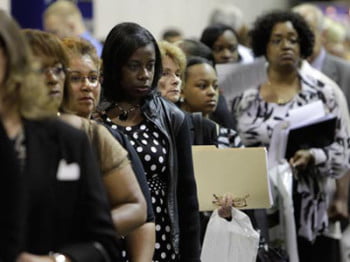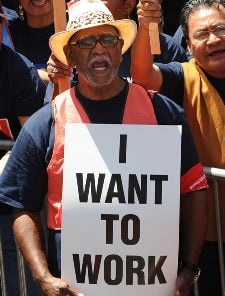Black Unemployment Rates Continue to Soar
By T.J. Moore
 When an American worker catches a cold, an African-American worker catches the flu.
When an American worker catches a cold, an African-American worker catches the flu.
After thirty years at a medical products and services firm, Alice found herself among the thousands of unemployed African-Americans during and after the “Great Recession.” proving that the phrase is valid at epidemic levels. “I certainly didn’t intend to be unemployed when I was,” she said, “[my layoff] was very disheartening. I was devastated!”
In 2010, Alice was soaring as a shift supervisor for the company until a new administration took over. Alice wasn’t in the department’s plans.“He [new boss] intended to get rid of me, I was terminated for things that I have never done before.” she said. Four years later, Alice is still searching for a job. She used her unemployment benefits and part of her pension to continue her education; still that was not enough.
She applied for jobs similar to the one she had consistently for years, but her attempt to catch on with the Department of Social Services had to be the most crushing for her. “I had the qualifications and years of experience with computer systems, and had a great interview,” Alice recalls “ I was sure that I was going to get this position. They gave it to someone else and said that I was too old and needed someone young and savvy. That just done it for me. I haven’t turned in a resume since August.”
According to the Bureau of Labor Statistics, the national jobless rate for December was 6.7 percent; for African-Americans, it was 11.9 percent, an 0.6 point decrease from November’s 12.5 percent figure. December’s numbers are also the lowest rate the unemployment rate for African-Americans has been in several months.
African-Americans bear a disproportionate share of the unemployment burden. While the unemployment numbers slowly continue to improve, the African-American percentages continue to fluctuate between 11 percent and 13 percent.
Why does a vast racial divide in unemployment remain while the national numbers slowly dwindle? The idea of subtile discrimination could be a clue. Fifty years after the Civil Rights act, which banned discrimination on the basis of race, ethnicity, national origin, religion and gender, raw and outright discriminatory practices has become rare. However there are some traces of covert discrimination.
McDowell Tech Small Business Director Joan Jackson believes there’s a link between the high number of black unemployment and some discrimination.
“I do believe that blacks are sometimes not hired because of discrimination. Not as much now as in the past, but it still happens,” she said.
 Alice agrees. “I know that it’s hard to get a job in western North Carolina, but I believe that part of it is discrimination. It is out there, and you can’t tell me that it isn’t. I’ve seen it and experienced it,” she said.
Alice agrees. “I know that it’s hard to get a job in western North Carolina, but I believe that part of it is discrimination. It is out there, and you can’t tell me that it isn’t. I’ve seen it and experienced it,” she said.
Another clue may be something as innocent as networking may be mistaken for covert discrimination. There is nothing illegal about helping an unemployed friend or family member. Networking for a circle of friends and close associates could be seen as discriminatory when there’s a tendency for whites to do it for other whites.
This type of exclusive networking usually leaves African Americans and other minorities on the outside of the loop on jobs. This was the theory of Rutgers University Professor, Nancy Di Tomaso. In her book The American Non-Dilemma: Racial Inequality Without Racism, DiTomaso concluded that in hiring
“the favoritism of whites towards other whites” is whats driving the racial gap in unemployment.
For her book, DiTomasso conducted 246 interviews with working class and middle class whites in New Jersey, Ohio, and Tennessee. DiTomasso found that while the vast majority of people interviews believed in equal opportunity, they also believed in helping their friends and family members-who for the most part were also white. DiTomasso also found that the whites she spoke with “did not acknowledge the group based advantage” they had. Jackson believes in the power of proper networking as a tool to help close the gap. “Black businesses need to reach out with scholarship and internships to young black students.” she said. “Black businesses don’t consistently reach out to offer assistance, insight, and networking like they should, and it’s hurting those who are searching,” she said.
 While African Americans may be at a disadvantage when it comes to networking, they attempt the same assists and aids within their networks, according to Deirdre Royster, author of Race and the Invisible Hand: How White Networks Exclude Black Men From Blue Collar Jobs. African Americans ask neighbors, spouses, the significant others of neighbors, relatives and friends about jobs. But the caveat is since the unemployment rates were higher before, during and after the recession, the number of people in a black network who are in a position to help are more limited. She stated in an 2013 Huffington Post interview.
While African Americans may be at a disadvantage when it comes to networking, they attempt the same assists and aids within their networks, according to Deirdre Royster, author of Race and the Invisible Hand: How White Networks Exclude Black Men From Blue Collar Jobs. African Americans ask neighbors, spouses, the significant others of neighbors, relatives and friends about jobs. But the caveat is since the unemployment rates were higher before, during and after the recession, the number of people in a black network who are in a position to help are more limited. She stated in an 2013 Huffington Post interview.
In Alice’s case, she tried networking but with little results. However, she believe in the power of creating viable networks and how it could help close the gap. This is something that she believes some black owned businesses and those in positions of influence fall short in. “I feel like we have to give back to the community,” she says. “ Sometimes we have a “I got mine you get yours mentality, and it makes me sick.”
If it wasn’t discriminating enough for the African American job seeker to be passed up because of the lack of networking, they have to worry about discrimination during the interview. Jackson believes that there are telltale signs of a biased interview. “Pay attention to the quality of the questions that are being asked. Look for the lack of eye contact and body language, and the lack of willingness of the interviewer to allow you to ask questions about the company. Any statements that are not relevant to the company or job position, and unprofessional comments” she said.
In addition to subtle discrimination, African Americans have to contend with the link between education and employment outcomes. According to the 2012 Department of Labor special report on the African-American labor force, unemployed African-Americans with only a high school diploma experienced a 24.6 percent unemployment rate compared to 12.7 for whites with the same educational level. African-Americans with at least a bachelor’s degree had an unemployment rate of 7.1 percent compared to 3.9 percent for whites.
BLACK UNEMPLOYMENT DURING AND AFTER the GREAT RECESSION
SOURCE: BUREAU OF LABOR STATISTICS
While the unemployment rates are higher than whites at every educational level, the unemployment rates for African-Americans who attained a bachelor’s degree or higher. “I think Blacks with college degrees have a much better chance in obtaining professional jobs than those without degrees. At least with a bachelors, you should have been exposed to and received the skills necessary for survival in a competitive marketplace,” she said.
Education and training has consistently been the primary solution to bridge the gap. As of September of 2011, it has been reported that over 30,000 African-Americans have been served by the DOL’s community based job training grants( 16 percent of all participants) and 23, 636 African Americans (25 percent of all participants) have been served through the DOL’s American Reinvestment and Recovery Act Hight Growth and Emerging Industry grants At the time of the report, of the 2.5 million the Workforce Investment Act (WIA) Adult and Dislocated Worker program participants who received staff assisted serves over the span of a year, more than 21 percent of the participants were African-American. Nearly half of those participants were able to to find work within the quarter after they exited the program.
In addition to serving adults and dislocated workers, the WIA extended help for the youth. The WIA youth program (ages 14-21) assisted African-Americans by placing nearly 22,000 individuals into employment or education programs within a year. In the first year of it’s inception, the program served more than 93,000 African-American participants.
Entrepreneurship could be a potential solution for those still searching. According to the resent U.S. Census Bureau survey, African-Americans owned 1.9 million businesses, which represented 7 percent of the total. While that was a 60 percent jump in a five year span, the average revenue at those businesses decreased. by 3 percent to $72,000 a year. While these numbers were pre-recession, start ups could be an alternative.
However there’s a huge caveat at play. Funding for black businesses is challenging. Black borrowers face perceptions of inferior skills, goods and expectations. It’s a challenge to get proper funding for a business regardless of ownership when banks are reluctant to lend. Jackson believes that entrepreneurship, while lofty can be a long term solution. It is hard to summarize what one must do to create their own job and opportunity. A person has to be willing to sacrifice time, efforts, be able to work with discipline, independence, and most of all believe in themselves.”
While Alice may be discouraged and disheartened now, she still believes that the doors will eventually open.
“I know I’ll get a job,” Alice says, “when it’s God’s will.”





